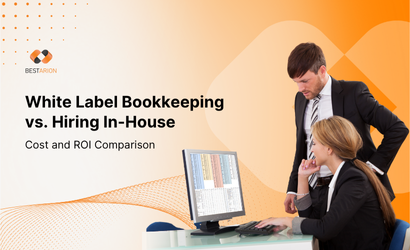White Label Bookkeeping vs. Hiring In-House: Cost and ROI Comparison

Thinking about white label bookkeeping vs. hiring in-house? Here’s what you need to know.
White label bookkeeping means you outsource your bookkeeping tasks to a trusted third party who works under your brand. Hiring in-house means you bring someone onto your payroll to handle bookkeeping directly. For many U.S. accounting firms and small businesses, the choice depends on cost, flexibility, and how fast you want to scale. White label services often cost less, require no extra overhead, and help you grow without hiring more staff.
While both options have their merits, the right choice often comes down to long-term cost-effectiveness and return on investment (ROI). In this in-depth guide, we’ll break down both approaches, compare their financial and operational impacts, and explore why an increasing number of U.S. firms are choosing to outsource bookkeeping through white label partners.
Read more: What Are White Label Accounting Services? Ultimate Guide for US Firms
What Is White Label Bookkeeping?

White label bookkeeping is when you outsource your bookkeeping tasks to a third-party provider who works under your brand name. The end client only sees your firm’s branding. This model allows accounting firms to scale their operations, deliver consistent service, and improve profitability without increasing internal headcount.
This model is particularly popular with CPA firms, virtual CFO providers, and financial consultants looking to expand their service offerings without overloading internal staff.
How does it work?
The provider handles tasks like data entry, reconciliation, and reporting using your tools or theirs, following your internal processes and deadlines.
Read more: Top 4 Outsourced Bookkeeping Companies in Vietnam for CPA Firms
What Does Hiring an In-house Bookkeeper Involve?
Hiring in-house means employing someone directly on your team to manage bookkeeping tasks full- or part-time. This employee may work from your physical office or remotely, and they are part of your payroll, with full benefits and compliance responsibilities.
For many decades, this was the default model for businesses managing their financial records. However, with rising employment costs and a more flexible global labor market, this approach is increasingly being questioned—especially for firms with fluctuating workloads.
What are the responsibilities?
In-house bookkeepers typically handle AR/AP, payroll, general ledger management, and financial reporting, often under close internal supervision.
Read more: Bookkeeping Services in San Francisco: Local Experts or Offshore Teams?
Cost Comparison: White Label Bookkeeping vs. In-House Hiring
How much does white label bookkeeping cost?
White label bookkeeping typically costs between $12 and $30 per hour, or $200–$500 per client per month, depending on complexity and location. Offshore providers often charge less than U.S.-based firms.
What pricing models are common?
-
Hourly billing
-
Per-client flat fee
-
Tiered pricing based on services
What is the cost of hiring an in-house bookkeeper?
An in-house bookkeeper in the U.S. costs around $47,000 to $60,000 annually, plus 20–30% in overhead like benefits and taxes. Costs are higher in metro areas and for experienced professionals.
What are additional expenses?
-
Recruitment and training
-
Payroll taxes
-
Health benefits and PTO
-
Office equipment and software
Which option has lower overhead costs?
White label bookkeeping has significantly lower overhead. You avoid payroll taxes, employee benefits, hardware, and office space costs.
Why is this important?
Overhead adds 20–30% to salary costs. Outsourcing allows businesses to pay only for what they use without fixed staffing costs.
To make a truly informed decision, let’s compare these models across various cost categories.
1. Base Salary and Hourly Rates
-
In-House Bookkeeper: According to the U.S. Bureau of Labor Statistics (2024), the average salary for a full-time bookkeeper in the U.S. is $47,000 – $60,000 annually. This figure can be significantly higher in metropolitan areas.
-
White Label Bookkeeping: Outsourcing partners typically offer pricing models based on per-client, per-hour, or per-transaction terms. Costs often range between $12 and $30/hour depending on the complexity of work and the provider’s location (offshore vs. U.S.-based).
Verdict: White label providers, particularly offshore ones, offer significantly lower hourly rates without compromising quality.
2. Overhead Costs
-
In-House: Includes payroll taxes, office space, computers, software licenses, benefits (healthcare, 401(k)), PTO, and training. These can add 20%–30% to the base salary.
-
White Label: All operational and administrative costs are borne by the service provider. You only pay for completed work.
Verdict: White label bookkeeping eliminates most overhead costs.
3. Software and Infrastructure
-
In-House: You must pay for licenses of tools like QuickBooks, Xero, NetSuite, and other systems. You’re also responsible for maintaining secure IT systems and data backups.
-
White Label: Reputable providers come with their own infrastructure or use your tools via remote access. Either way, they shoulder much of the IT burden.
Verdict: White label solutions reduce infrastructure costs and maintenance headaches.
4. Hiring, Onboarding, and Turnover
-
In-House: Recruiting takes time and money. The cost of a bad hire or employee turnover is steep—often up to 30% of the employee’s annual salary.
-
White Label: Onboarding is fast and typically included in the service package. If someone leaves the outsourcing firm, a replacement is provided with minimal disruption.
Verdict: White label services offer lower risk and faster scaling.
ROI Analysis: Which Option Offers Better Long-Term Value?
Which option offers better scalability?
White label bookkeeping is more scalable. It lets firms quickly ramp up or down based on workload without hiring or laying off staff.
How does this help your business?
You can take on more clients without delay, reduce costs during slow periods, and expand services without hiring internally.
Which provides better long-term ROI?
White label bookkeeping generally delivers higher ROI due to lower costs, better scalability, and less management time.
What drives the ROI?
-
Reduced labor and infrastructure costs
-
Faster delivery of services
-
More time for advisory and revenue-generating work
ROI goes beyond just dollars spent. It also considers productivity, scalability, quality of service, and business agility.
1. Scalability and Flexibility
-
In-House: Scaling up means hiring more people. During slow seasons, you still pay fixed salaries.
-
White Label: You pay for what you use. Whether you add five or 50 clients, the workload can be redistributed with minimal friction.
Impact on ROI: White label partners enable agile scaling, maximizing ROI during peak and slow periods.
2. Focus on Core Business
-
In-House: Management must allocate time to supervise employees, track KPIs, and handle HR issues.
-
White Label: The vendor handles personnel management. You focus on client acquisition, strategy, and advisory services.
Impact on ROI: White label support allows partners to concentrate on high-margin services.
3. Expertise and Quality Assurance
-
In-House: Skill levels vary based on your hiring ability. Errors can slip through due to lack of training or oversight.
-
White Label: Established providers employ teams of trained professionals with QA processes and domain expertise.
Impact on ROI: Better accuracy leads to higher client satisfaction and fewer compliance issues.
4. Technology Utilization
-
In-House: Adopting automation requires investment and training.
-
White Label: Most providers already use advanced tools like OCR, RPA, AI-based reconciliation, and integrations with accounting platforms.
Impact on ROI: Leveraging cutting-edge tools through your partner enhances service delivery without capital investment.
Summary Table: White Label vs. In-House
| Feature | White Label Bookkeeping | In-House Bookkeeper |
|---|---|---|
| Average Cost | $12–$30/hour | $47K–$60K/year + overhead |
| Scalability | High | Limited by hiring timelines |
| Overhead | Low | High |
| Control | Moderate | Full |
| Speed to Deploy | Fast | Slow (due to hiring/training) |
| ROI | High | Moderate |
Is quality better with in-house or outsourced bookkeepers?
Both can deliver high-quality work, but white label providers often have teams of trained professionals and built-in quality checks.
What ensures quality?
Look for providers with:
-
Dedicated account managers
-
QA processes
-
Experience with your accounting software
-
Data security compliance
What Are The Potential Risks of White Label Bookkeeping?
Risks include data security concerns, reduced control, and potential communication gaps. These can be mitigated with the right provider and clear workflows.
1. Data Security
-
Risk: Sharing financial data with an external provider raises concerns.
-
Mitigation: Work with SOC 2-certified providers, use NDAs, and insist on secure cloud platforms and access control protocols.
2. Loss of Control
-
Risk: Some fear losing control over service quality and delivery.
-
Mitigation: Set up clear SLAs (service-level agreements), use project management dashboards, and hold weekly check-ins.
3. Brand Integrity
-
Risk: Miscommunication or inconsistencies could affect client experience.
-
Mitigation: Use white label providers who work under your branding and follow your SOPs and tone guidelines.
What Are The Benefits of Hiring In-house?
Hiring in-house gives you more control over processes, team culture, and immediate collaboration. It’s a good option for firms with sensitive data or custom workflows.
When is in-house the better choice?
-
High-security environments
-
Complex, proprietary systems
-
Full-time support needs
-
Real-time team collaboration
When Should You Choose White Label Bookkeeping?
White label bookkeeping is an ideal fit if:
-
You’re experiencing rapid growth and can’t keep up with bookkeeping tasks.
-
You want to expand your service offerings (e.g., virtual CFO) without growing internal overhead.
-
You’re facing talent shortages or hiring delays.
-
You want to improve margins without compromising on service delivery.
When Hiring In-House Makes Sense
Despite the many advantages of white label bookkeeping, hiring in-house may still be beneficial when:
-
Your operations require a bookkeeper with deep institutional knowledge.
-
You have proprietary systems that don’t support remote access or third-party integration.
-
You prioritize close cultural alignment and real-time team collaboration.
-
You’re managing highly sensitive or regulated financial data and prefer internal oversight.
The Hybrid Model: Can I Combine Both Options?
Yes. Many forward-thinking accounting firms are blending both models. They keep a small in-house team for high-touch client relationships and oversight while offloading routine tasks like:
-
Bank reconciliation
-
AR/AP management
-
Payroll processing
-
Monthly reporting
This hybrid model enhances operational efficiency while maintaining control and improving client satisfaction.
Case Study: Real-World ROI of White Label Bookkeeping
Let’s consider a 10-client accounting firm in New York.
Scenario 1: Hiring In-House
-
1 Full-time bookkeeper: $55,000/year + $13,000 in overhead
-
Cost per client: ~$5,600 annually
Scenario 2: White Label Provider
-
Per-client flat fee: $350/month
-
Annual cost per client: $4,200
-
Total annual cost for 10 clients: $42,000
Savings: $26,000/year (not including savings in time, software, and management overhead)
Over three years, the firm can reinvest nearly $80,000 into client acquisition, marketing, or upgrading advisory services—all of which generate significantly higher ROI.
Final Verdict: White Label Bookkeeping Wins on ROI and Cost
For the majority of U.S.-based accounting firms and SMBs, white label bookkeeping offers:
-
Lower total cost of ownership
-
Faster scalability and service expansion
-
Higher margins and ROI
-
Reduced administrative burden
-
Access to specialized talent and tools
While in-house hiring can still be a good fit for certain organizations with complex internal needs, the current business environment—with its emphasis on agility, efficiency, and client-centric growth—favors white label partnerships.
How to decide:
-
Want to scale fast with minimal cost? → Go white label.
-
Need deep internal knowledge and team integration? → Hire in-house.
-
Want both? → Choose a hybrid model.
Looking Ahead
As automation, globalization, and client expectations continue to reshape the accounting industry, white label services are no longer just a stopgap—they’re a strategic advantage. Firms that embrace this model today will be better positioned to compete, grow, and thrive in the years ahead.
If you’re a U.S. CPA firm evaluating your options, start by analyzing your current costs, identifying bottlenecks, and exploring white label partnerships that align with your service goals and brand standards.






